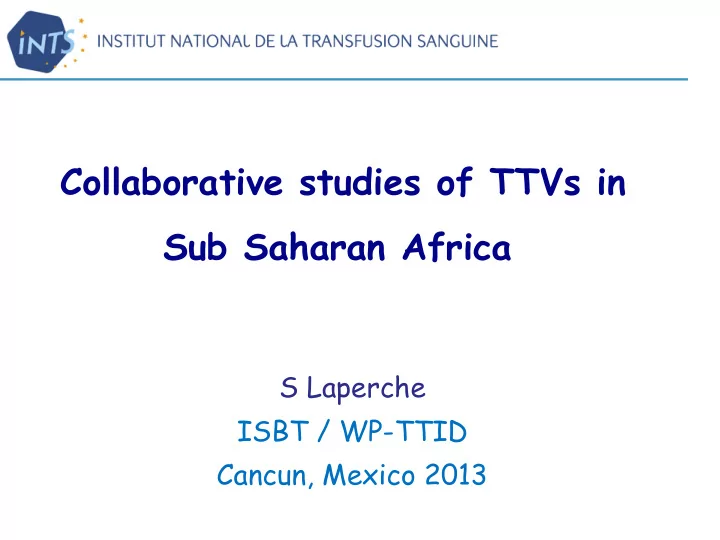

Collaborative studies of TTVs in Sub Saharan Africa S Laperche ISBT / WP-TTID Cancun, Mexico 2013
Network based on the Francophone Sub Saharan African working group for research in transfusion Created on the basis of a training on transfusion safety-infectious diseases annually organized at the Institut Pasteur, Paris, since 2007 (JJ Lefrère, E Murphy, C Shiboski) Majority of attendees are from Sub Saharan Africa Several collaborative studies: >10 publications
2 nd Quality Control in Francophone Africa, 2010 17 participating countries- 51 centers- 60 panels tested Marocco Tunisia 4 labs 3 labs 4 panels 4 panels Mali 3 labs 3 panels Burkina Faso Niger 5 labs 3 labs 5 panels 3 panels Senegal 4 labs Democratic Republic 4 panels of Congo 2 labs Guinea 2 panels 1 lab 1 panel Rwanda 2 labs 2 panels Ivory Coast 2 labs 2 panels Burundi 1 lab 5 panels Benin 1 lab Togo 4 panels Comoros 2 labs 1 lab 2 panels 1 panels Cameroun 4 labs 4 panels Madagascar 7 labs 7 panels Congo Brazaville 7 labs 7 panels
3 nd Quality Control in Anglophone Africa, 2011 12 participating countries- 43 centers- 43 panels tested Cap Verde Uganda 2 Centers 6 centers Kenya 8 centers Tanzania 7 centers Ghana 3 centers Zimbabwe Nigeria 1 center 7 centers Mauritius 1 center Zambia 2 centers South Africa 3 centers Botswana 2 centers Lesotho 1 center
Conclusions Recommandations 1) the use of ELISAs and especially Ag/Ab ELISAs should be recommended over rapid tests whenever possible 2) better training of laboratory technicians and improved algorithms for test interpretation 3) Organization of periodic external quality assessment to maintain an acceptable level of transfusion safety. 5
The first international study for estimation of HIV RR in Sub Saharan Africa based on IR/WP model : 1/29,000 donations Limitations (retrospective study) - Misclassification of positive or negative donations due to the assays - Model based only on repeat donors (less than 15%) - Limited study period
Aims of the proposed study Based on the Francophone Sub Saharan African working group for research in transfusion 1) Estimates of RR for HIV, HBV, HCV by detecting incident cases with NAT 2) Formation of a repository of antibody and NAT+ samples 3) Molecular epidemiology of viral isolates NOT A feasibility study of NAT in Africa BUT The first prospective study in the African continent aimed to directly estimate the RR
Study design Collection and storage a total of 100 000 consecutive samples from operationally tested donations; e.g. 10,000 samples from each of 10 African countries (Sample size calculated on the basis of an expected IR at 0.10%) Antibody positive samples removed and subjected to confirmatory testing using rigorous algorithms Antibody negative samples tested by HIV, HCV and HBV NAT in pools; ID NAT on all members of positive pools
Recommend
More recommend